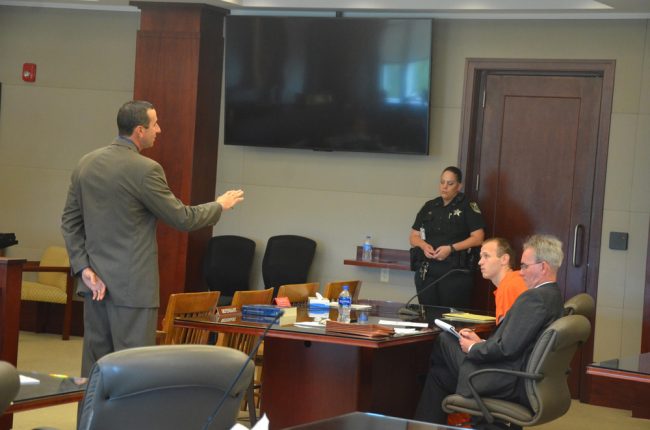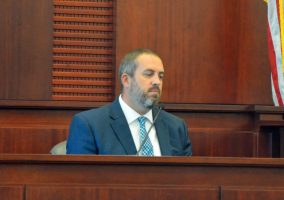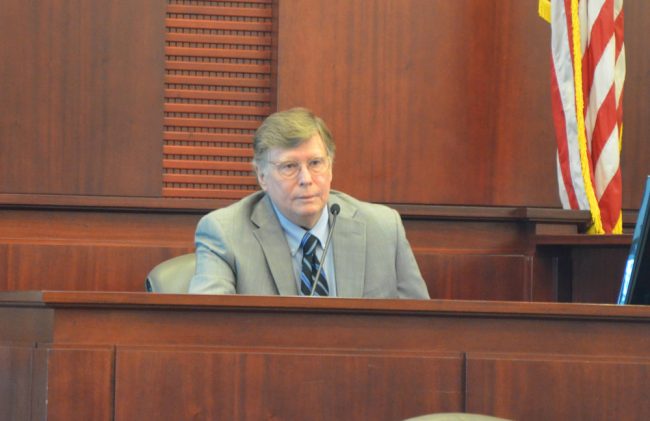
A judge today denied a motion by 27-year-old James McDevitt to throw out his 40-year sentence for raping a woman in Flagler Beach in 2013. McDevitt will return to prison to serve 34 remaining years on his sentence, though he may be eligible for early release in 28 years in 2047, after serving 34 years in total. He would be 55 at the time.
McDevitt was 21 at the time of the rape. He argued through his attorney, Daniel Hyndman, that he’d received ineffective counsel from two previous attorneys–Kenneth Hamburg and Michael Lambert.
The incident took place in the early hours of June 14, 2013, when McDevitt encountered the woman (38 at the time) who claimed she’d had a fight with her boyfriend and was looking for an address between south 14th and South 12th Street. The rape took place in an empty lot on 12th Street, across the street from the house of a minister who was on his porch when it took place. The minister called 911. “That’s not the man I am,” McDevitt had said at his sentencing hearing, apologizing to the victim, “and I hope that she’ll be able to get through everything and hopefully be able to move on with her life after this.”
McDevitt, who has a learning disability and who all parties involved agree is somewhat “slow” to understand issues, claimed Hamburg didn’t effectively explain a 10-year plea offer the state had made at one point, and that Lambert at the time of the plea months later had promised him he would get no more than 10 or 15 years. Then-Circuit Judge J. David Walsh sentenced him to 40 years followed by 20 years’ probation in what’s called an “open plea,” which left it up to the judge to sentence him to anything from no time to life in prison. The state had asked for 40 years to coincide with the age of the victim at the time of the rape.
McDevitt and the two attorneys all testified in a nearly-two-hour hearing before Circuit Court Terence Perkins today. Led into the courtroom by two deputies, in his orange jail jumpsuit, hands and feet shackled, McDevitt, significantly thinner than he’d been a few years ago, smiled in the direction of the 16 family members and friends sitting in rows behind the defendant’s table, with one absence: Lisa McDevitt, his mother, and the former director of the Flagler Auditorium, had died in January, though her name would come up several times during Lambert’s testimony. From time to time a “that’s not true” or an audible disapproving huff would be heard from the group of 16–as the prosecutor was cross-examining McDevitt–but never to the point of provoking the judge’s intervention.
McDevitt charged in his motion and in court today that Hamburg had seemed hurried and uninterested in his case while Lambert hadn’t followed through with such pledges as speaking to the judge of the victim’s prior issues with drugs and alcohol, and that he’d promised him that the sentence would not be nearly as steep as what it turned out to be.
But Assistant State Attorney Jason Lewis, who argued the case for the state, mercilessly demolished McDevitt’s claims one after the other. McDevitt consistently rejected the 10-year plea offer, his attorneys said, because he felt he’d done nothing wrong. But he said Hamburg never explained to him why he should take the offer, nor had Lambert explained that he could face life in prison. The two attorneys denied both claims.

But he was in court when Walsh explained the penalties McDevitt was exposed to.
“And Judge Walsh apprised you that your maximum penalty is life in prison, correct?” Lewis asked McDevitt today.
“Yes, sir,” McDevitt said.
“And you told him you understood that.”
“Yes, sir.”
“OK,” Lewis continued, “so were you lying to Judge Walsh when you told him that you didn’t know your exposure was life in prison?”
“No, sir.”
“OK, so, as we sit here today, you’re telling the judge who’s sitting here today that you didn’t know your exposure was life in prison?”
“I hadn’t known it until the day of court, sir.”
“OK, the day of court you knew, though, correct?”
“Yes, sir.”
“OK, so you’re testifying that Mr. Lambert never told you that beforehand?”
“Mr. Lambert never told me that beforehand.”

But Lewis then showed that much of what McDevitt was saying was either untrue or contradicted the record, starting with the initial “information” the state attorney’s office had filed, charging McDevitt with a first-degree felony that exposed him to 30 years in prison. McDevitt said if he knew he faced 30 years, “I still would have taken the plea.” Lewis showed him the document proving he knew it could be 30 years.
Lewis then showed him another document bearing McDevitt’s signature, and showing that Lambert had told him a day before his appearance before Walsh that he was made aware of the “open plea” possibility, contradicting his claim that he learned of it only when he walked into court. “At the very least you knew the day before you were facing life in prison,” Lewis told him, showing him the dated document McDevitt had signed.
Lewis then disproved, with documents, McDevitt’s claim that Lambert had not told the judge of the victim’s prior issues, and showed yet another document disproving McDevitt’s claim that he’d been promised a sentence that would be in the 10-15 year range.
“So you signed that saying no one made you a promise, right?” Lewis asked him, document in hand.
“Yes, sir,” McDevitt said.
It did not get better when Lambert–one of the shrewdest and most effective attorneys in the region, no matter what place he may occupy in the courtroom–sat in the witness box and answered Lewis’s questions.The situation forcibly turned the defendant’s attorney into the prosecution’s chief witness for its case, though in effect Lambert was defending himself, his methods and his reputation, at this point. He did so with unexpected candor that revealed for the first time in open court the defense attorney’s thinking as it evolved in McDevitt’s case, his horror at the actual evidence–Lambert did not think McDevitt had a chance at trial–but also his regret that there hadn’t been a “hard sell” of the 10-year plea offer, by Hamburg or by himself, as long as it was on the table.
McDevitt and his mother (Lisa) had fired Hamburg and hired Lambert when McDevitt felt Hamburg wasn’t getting the job done. At first Lambert was “shocked,” in his word, that a 10-year plea offer had been tendered to McDevitt. That signaled to Lambert that there was something wrong with the case. He wanted to know all the evidence, and told McDevitt that it would take time. By the time he’d gathered the material, the offer was off the table–for good reason: the new assistant state attorney who took over the case for a previous one told Lambert that she’d never had made the offer herself, and was, in fact, now aiming for life in prison.

Lambert’s testimony today was devastating to McDevitt’s case even if it had gotten further than today’s hearing:
“I spent an awful lot of time–one, I came to like him very much, and think a lot of him,” Lambert said of McDevitt. “So I spent an inordinate amount of time with him.” He then gave an unusual, public analysis of the case he had to handle: “There were some facts that, if taken in isolation, you’d begin to say, OK, he is innocent. The fact that, you know, she was on top of him. The fact that, you know, she asked him. It was just–it’s peculiar. Her mental health was horrible, but that’s a two-way story. The fact that she had consumed alcohol as well. But then there was, like the 911 call, the prior attorney was talking about. It was basically a play-by-play by I think somebody that was a minister, watching it. It was just horrible. And she arrives at the hospital and her mouth is full of sand, where her face according to her had been pushed into the sand. And there were now multiple allegations of sex acts instead of a singular one. She said there was a separation in time. James had a huge bite mark on his cheek, and you know I told him that, you know, that’s unusual. That, to me, if I were a juror, I’d be sitting there going, you know, why is somebody biting you, not because they love you, and they want to have sex with you. Because they want to stop. So I said here you know James, we have to put all this together, and again, she’s got the dirt in her mouth. Why she’s on top, she said she fell unconscious.”
At the sentencing hearing, the victim testified and said she reached the point where she gave up and prayed.
Lambert said he made his recommendation to McDevitt with all the facts in hand. “The very first time I saw that there were some things different, but as time progressed and I met with him, I saw that it was really worse and worse, so I was spending more and more time with him,” Lambert said. He stressed he’d never made a promise to McDevitt that the judge would go easy on him. “To me,” Lambert said, “whenever an allegation like this is made, it always amazes me when the person is sentenced, human nature would be that you would scream from the highest rooftops, wait a minute, my lawyer just told me I couldn’t get anymore than 15 years, and I never heard that because I never told him that. I told him the judge wouldn’t give him the maximum. I didn’t believe the judge would give him the maximum, because he’s giving a plea.”
But Lambert also repeatedly said that “it should have been pounded into him that he should have taken the 10 years,” and himself took responsibility for not being that insistent, when he had the chance.
“We can conclude from Mr. Lambert’s testimony that he may be kicking himself on this case,” Hyndman, McDevitt’s attorney, said in his closing argument to the judge, making a clear case for “post-conviction relief.”
It looked that way for a moment, though McDevitt’s current attorney was basing his evidence on what McDevitt’s sympathetic former attorney had said–not on what the evidence presented to the court today showed: an attorney’s mistakes or regrets is not in and of itself cause for reversing a sentence, unless it is the defining factor in a case. Lewis argued to the judge that it was not so in this case, given the evidence–that it was essentially McDevitt’s retrospective regret rather than his lawyers’ failures that were driving the motion for relief.
Both lawyers had spoken of McDevitt’s insistence that he’d rejected offers because he thought he was innocent, while McDevitt, despite today’s testimony, could not show what specifically stopped him from demanding a trial, though Lambert suggested that McDevitt would not have survived the victim’s testimony: “I’ve also seen a lot of mental illness in my life, and I can see from her side as well,” Lambert said of the victim. “She came across as pathetic, and that’s scary.”
Perkins broke down the defense’s arguments and refuted them each in turn, starting with McDevitt’s slowness: the judge said McDevitt had done a “darn good job of answering all the questions in that regard.” (It was true enough, but it reduced an individual’s comprehension down to an ability to provide yes and no answers without giving credence to a simplicity of mind that was equally on display.) The judge seemed most put off by the fact that McDevitt “did not and would not” accept the 10-year plea offer “in open court even when the offer was getting ready to be withdrawn.” He did not fault either lawyer for their counsel.
“It’s the court’s judgment that the motion for post-conviction relief be denied,” Perkins ruled an hour and 43 minutes into the hearing. He delegated Lewis to write up the order.
McDevitt had been at the Flagler County jail since Friday. He is expected to be transferred back out to Taylor prison in Perry, 200 miles northwest of Palm Coast, before the end of the week.






























Haw Creek Girl says
Something doesn’t seem right. The evidence is sketchy and he gets 40 years. Yet in your earlier article, the evidence was clear cut and the result was death and that defendant got 5 years. Scratching my head.
Agkistrodon says
How do I spell “relief”? CONSEQUENCES. End of Lesson.
Ritchie says
What a sad story! 40 years for a bad urge!
Ritchie says
I’ve seen smaller sentences for murder.
Bobby V says
“40 years for a bad urge”. What are you talking about? He didn’t get 40 years for a bad urge. He got 40 years for raping someone. Wtf?